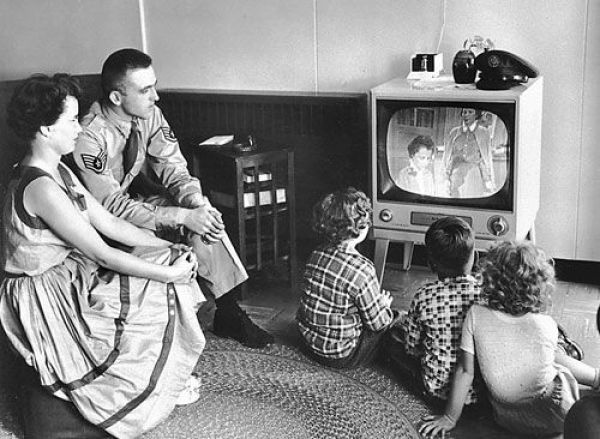The U.S. is one of the richest countries in the world because it has perfected the art of making people loathe themselves. Glamorous fashion magazines and accelerated trend cycles make us feel as if we need more: more sunglasses, more shoes, more Chanel perfumes, more Dolce and Gabbana belts. In order to sustain itself, capitalism ultimately must make us feel like who we are and what we have isn’t enough. After all, why would we spend money to acquire more things unless we were discontent with ourselves? Dissatisfaction equals profit. As historian Frederick Allen once wrote, the consumer must be persuaded to “buy and buy lavishly” or else “the whole stream of six-cylinder cars, super heterodynes, cigarettes, rouge compacts and electric ice boxes” will not sell.
Shiny shopping malls glitter with the promise of solving our problems. Too shy? Buy a sophisticated blazer and finally be bold enough to speak up at board meetings. Too klutzy? Buy an expensive pair of designer heels and you’ll strut like a supermodel instead of stumble through the streets awkwardly. The secret to being happy/lovable/charismatic/confident—we believe— lies in clothing racks and checkout lines.
When we empty our wallets, we’re not just buying an object— we’re buying an idea. Why do you think women have loyally bought Chanel N°5 since 1921? Do they dish out over a hundred dollars for the mysterious scent of rose and jasmine, bright citrus top notes, and sensual touch of vanilla? Or do they buy it for its timeless rectangular bottle?
No, Chanel N°5 remains the world’s most iconic perfume because of its mystique, its aura. N°5 isn’t just a fragrance: it’s a pathway to becoming the woman in the ad, a classic beauty in diamond earrings and fur stole. Millions of women flock to the perfume counter for this world-famous fragrance in hopes that it will transmit the qualities of Chanel: effortless elegance, enduring style. As loyal citizens of America, the cellophane-wrapped land of McDonald’s and Coca Cola, we swipe our credit cards because we believe what we buy will transform us into better versions of ourselves.

But despite what our consumerist culture tries to convince us, a bottle of perfume or Prada bag can’t solve our complex psychological problems. If we call ourselves disgusting fat cows every time we look in the mirror, no piece of clothing, no matter how stunning, will ever make us feel beautiful. Love, happiness, self-worth: all are internal issues.
In her revelatory All About Love, scholar, feminist and cultural critic bell hooks argues our society is sick because we care more about things than people. Since the 1950s, we’ve descended into a netherworld of materialism where we seek material solutions to spiritual problems; if we’re bored, we buy the latest trend on TikTok; if we’re overcome with existential dread during our lunch hour, we buy new shoes. Such material things might offer a momentary thrill but they never really get to the heart of our issues. As hooks, writes:
“Although we live in close contact with neighbors, masses of people in our society feel alienated, cut off, alone. Isolation and loneliness are central causes of depression and despair. Yet they are the outcome of life in a culture where things matter more than people. Materialism creates a world of narcissism in which the focus of life is solely on acquisition and consumption. A culture of narcissism is not a place where love can flourish…Left alone in ‘me’ culture, we consume and consume with no thought of others. Greed and exploitation become the norm where an ethic of domination prevails. They bring in their wake alienation and lovelessness. Intense spiritual and emotional lack in our lives is the perfect breeding ground for material greed and over-consumption. In a world without love the passion to connect can be replaced by the passion to possess.”

Rather than seek fulfillment from objects and prioritize products over people, hooks believes we should focus on loving, both ourselves and other people. Love— what she defines as “the will to extend one’s self for the purpose of nurturing one’s own or another’s spiritual growth”— is ultimately what makes life worthwhile.
 indefinite emotion. Though at first love seems beyond definition, too elusive to be captured in a semantic net of description, hooks attempts to define love because “our confusion about what we mean when we use the word “love” is the source of our difficulty in loving. If our society had a commonly held understanding of the meaning of love, the act of loving would not be so mystifying.” After all, we can only love (and be loved) if we know what love is. As Rebecca Solnit once so elegantly expressed, calling things by their true names
indefinite emotion. Though at first love seems beyond definition, too elusive to be captured in a semantic net of description, hooks attempts to define love because “our confusion about what we mean when we use the word “love” is the source of our difficulty in loving. If our society had a commonly held understanding of the meaning of love, the act of loving would not be so mystifying.” After all, we can only love (and be loved) if we know what love is. As Rebecca Solnit once so elegantly expressed, calling things by their true names